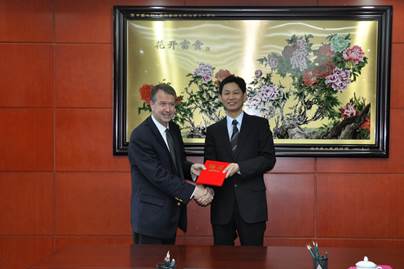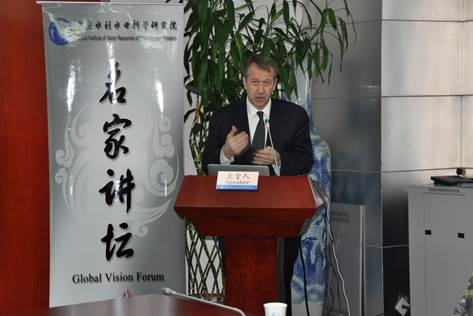Prof. Philippe Gourbesville, director of Polytech Nice-Sophia, Frace, visited IWHR on December 4, 2014 and met the institute’s president Dr. Kuang Shangfu to promote the implementation of a MOU signed earlier this year. He also made a report at IWHR’s Global Vision Forum on Hydroinformatics.
Dr. Kuang welcomed the director’s second visit in a year. He reviewed the close relationship between both sides in recent years, thanked Prof. Gourbesville’s excellent report at IWHR, and hoped the MOU could be materialized by fields and stages based on the current situation. During the meeting, he also conferred a letter of appointment on Prof. Gourbesville as the honorary professor of IWHR.

A letter of appointment (of IWHR’s honorary professor) was conferred on Prof. Philippe Gourbesville by Dr. Kuang Shangfu
The visiting director spoke highly of the friendly cooperation with IWHR, and said he was honored to be an honorary professor of the institute. He hoped substantial progress could be made in joint research, scholar exchange and joint education of postgraduate students. The head of the polytechnic university also made an introduction of the graduate student education program on hydroinformatics that involves five countries in Europe, and indicated the existing cooperative mechanisms that could be resort to in combination.

Prof. Philippe Gourbesville making a report on hydroinformatics at IWHR’s Global Vision Forum
During the ensuing Global Vision Forum that was chaired by IWHR’s Chief Engineer Prof. Gao Zhanyi, Prof. Gourbesville gave a report titled Hydroinformatics Challenges and Ways to Overcome Them.
The report systematically explained the challenges facing hydroinformatics in water utilization, natural environmental protection and response to natural disaster against the background of global information technology revolution, explosion of water-related data, acceleration of urbanization, and a change in water service demand. Typical cases in and out of Europe were studied, while analyses were made on the complexity and technological innovation of real-time dynamic management of urban water information, which includes the whole process from water source to the user end and from the conventional digital elevation modeling to the re-consideration of hydrologic modelling with new information technology, and the increasing concern on the water-energy nexus.

Exchange of viewpoints between the speaker and the audience